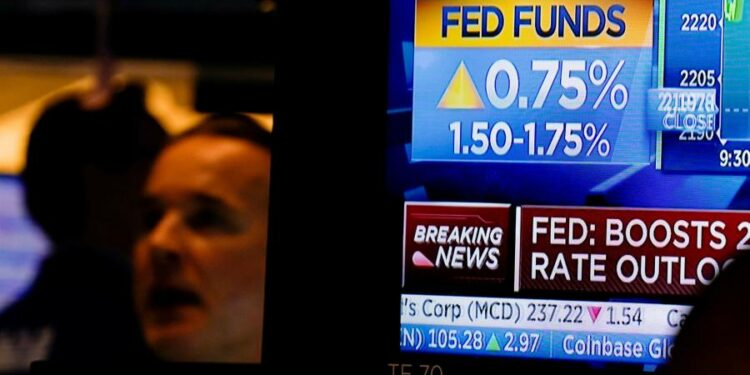Stocks and European government bonds sold off on Thursday as Switzerland and the UK joined a global rush to raise interest rates, following a sharp boost to borrowing costs by the US Federal Reserve.
Wall Street’s S&P 500 index slid 2.6 per cent in early dealings, with the technology-heavy Nasdaq Composite losing 2.9 per cent.
The S&P had closed the previous session 1.5 per cent higher after the Fed raised its main interest rate by 0.75 percentage points, with chair Jay Powell signalling that further rises of this magnitude would be relatively uncommon.
However, in the latest sign of how central banks are stepping up their efforts to tackle scorching inflation, the Fed’s decision was followed on Thursday by the Swiss National Bank raising its policy rate for the first time in 15 years — topping forecasts with a 0.5 percentage point uplift.
“The SNB has for so long been in the ultra-dovish camp,” said Francesco Pesole, a currency strategist at ING. “If even they are hiking, it’s sending a message to markets that central banks are looking at this summer as their last chance to do something about inflation before we hit a global slowdown.”
The Swiss franc rose 2 per cent against the euro on Thursday to €0.98.
Europe’s regional Stoxx 600 share index, which rallied on Wednesday after the European Central Bank promised a new mechanism to support weaker eurozone nations from rising interest rates in the bloc, fell 2.1 per cent.
Sterling added 0.8 per cent against the dollar, bouncing back from earlier declines. The Bank of England had earlier on Thursday lifted its benchmark interest rate by 0.25 percentage points to 1.25 per cent.
Ahead of the announcement, investors had been divided over whether they expected a quarter-point or half-point rise.
UK government debt also extended its losses after the decision, with the 10-year gilt yield up 0.19 percentage points on the day at 2.65 per cent, as the BoE warned UK inflation might hit 11 per cent by October. Bond yields rise when prices fall.
The yield on the 10-year US Treasury note, which underpins global debt pricing, added 0.02 percentage points to 3.41 per cent.
Germany’s 10-year Bund yield rose 0.19 percentage points to 1.83 per cent as the price of the benchmark debt instrument fell. Italy’s equivalent bond yield added 0.06 percentage points to 3.88 per cent and Spain’s 10-year yield rose 0.12 percentage points to 3.01 per cent.
The ECB said on Wednesday it would “accelerate the completion of the design of a new anti-fragmentation instrument” to support the eurozone’s most indebted nations, initially causing Italian bonds to rally.
“They have a plan to develop a plan, but the market wants more detail,” said Willem Sels, global chief investment officer at HSBC’s private bank.
“It was good news that the ECB reacted,” said Nadège Dufossé, head of cross-asset strategy at fund manager Candriam, “but we have nothing new.”











